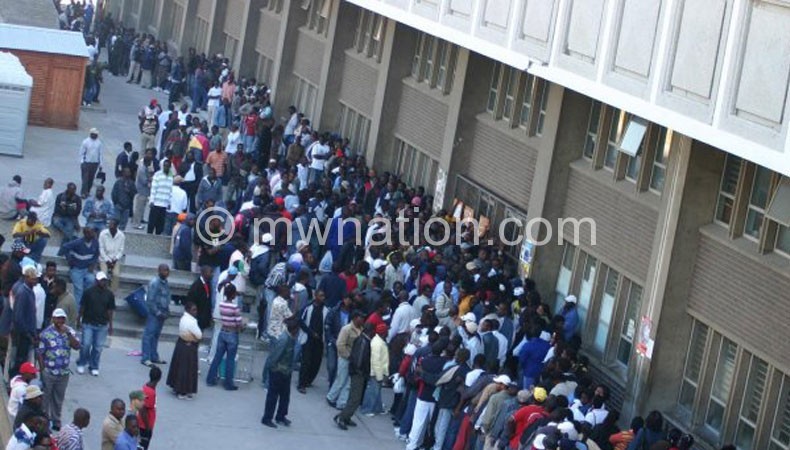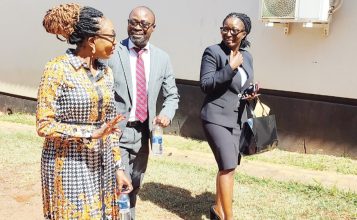Malawians stranded in SA

About 600 Malawians are currently detained at Lindela Repatriation Centre in Johannesburg in South Africa (SA) where, alongside other nationals, they are facing human rights abuses that include medical care deprivation.
Malawians, according to a survey report released by South African’s Human Rights Commission (SAHRC) last month, constitute 44 percent of detainees, topping the list of prisoners at the centre.
But while Malawi Government says it is aware of the hardships detained Malawians face in the neighbouring country and that government was on the top of the issue, Malawi High Commissioner to SA Stella Ndau has faulted the report, which she decribed as “factually incorrect”.
In an interview on Friday, Ndau said as of last Wednesday, there were 600 Malawians and over 1 000 Zimbabweans detained at Lindela, “yet the report indicated Malawians are topping the list.”
The report, which we have, details how the South African government systematically infringes on the human rights of the detainees arrested for lack of proper documents.
The survey established that the South Africa’s Department of Home Affairs violated the rights of detainees by blocking their access to health care, in contravention of the country’s constitution.
The report, quoting Dr Gilles Van Cutsem of MSF in South Africa, reads in part: “Considering the high prevalence of HIV and TB in southern Africa, where most migrants come from, this is a very worrying situation. People who interrupt their treatment are at risk of being sick or developing resistance to HIV treatment, leading to further health complications.
“It is also dangerous not to screen for tuberculosis, a highly infectious disease that can spread quickly through non-infected detainees in the crowded conditions of detention highlighted in the report.”
The survey was conducted by SAHRC following complaints of ill-treatment of foreigners at the Centre, and it revealed that 20 percent of the detainees are from Zimbabwe, 11 percent from Mozambique, five percent from Nigeria and three percent from the Democratic Republic of Congo.
Spurred by complaints by three civil society organisations: Doctors Without Borders (MSF); SECTION27 Lawyers for Human Rights; and People Against Suffering, Oppression and Poverty (Passop), the survey also established that many detainees were held indefinitely and in excess of the legal limit of 120 days.
The survey further revealed that most detainees were not informed of their legal rights and possibility to challenge or review their detentions.
The report says South Africa’s Parliament also committed to holding the Department of Home Affairs to account by noting that the Committee on Home Affairs “is concerned that the centre is turning into a place of human rights abuses which cannot be condoned”.
Reads the report: “These findings seem to further suggest that the overall practices at the centre are questionable and undermine the mainstay of South Africa’s democracy, the Bill of Rights, which protects everyone within the borders of the country.”
Foreign Affairs Minister Dr George Chaponda said in an interview on Friday that President Peter Mutharika has first hand information on the welfare of Malawians in SA.
Chaponda disclosed that the President, in transit to the United States of America (USA) where he attended a United Nations summit, stopped over in SA and had a meeting with Ndau.
“The High Commissioner briefed the President, in my presence, about the hardships detained Malawians face in South Africa.
“Some of these Malawians get arrested and deported, but they still find their way back to South Africa. The President said it is all about employment problems in the country,” he said.
Standwell Manda, a resident of Wanda Village in Traditional Authority Mzikubola in Mzimba, spent almost three months at Lindela Repatriation Centre last year.
He recounted his experience in an interview with Nation on Sunday yesterday: “I was working as a gardener and I had overstayed. The police apprehended me in a shop where I had gone to buy relish. I was taken to Lindela where I stayed for almost three months before being deported to Lilongwe by plane.
“I don’t want to ever find myself at Lindela again. I contracted skin diseases because we are just bundled together with other illegal migrants.”
Manda, who had been in SA for a year said he lost all the property he had accumulated within that year.
“By the time I was able to alert someone to take care of my stuff, they discovered that my house had been broken into.
“It was a painful experience… I lost everything. I just came home with the clothes I was wearing,” he said.
Chaponda said as a long-term solution, the President said there is a need to fast-track projects such as the Green Belt Initiative to create jobs for Malawians.
“Those in problems in South Africa would be given a priority,” he said.
On reported human rights abuses, the minister said relevant government departments would keep their eyes open and ensure interests of Malawians detained in SA are protected.
Ndau said she needed more time to give a detailed response to a questionnaire sent through Ministry of Foreign Affairs on Tuesday. She had not responded to the questionnaire by the time we went to print.
South African High Commission to Malawi had also not responded to an emailed questionnaire that sought its reaction to the report.
According to the report, MSF welcomed the SA Commission’s recommendation to work on ensuring cross-border continuity of care in Southern Africa, including the establishment of referral systems for the hundreds of thousands mobile population in need of treatment for chronic diseases, especially HIV.
The report disclosed that South Africa is one of the world’s largest recipients of asylum seekers, many of whom end up detained at Lindela.
It said there are currently 298 092 asylum seekers and refugees in South Africa and an estimated 1.5 to two million migrants.





